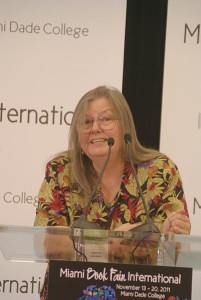I sang to myself as I walked, sometimes out loud. Ruth Brown’s “Mama, He Treats Your Daughter Mean.” Patsy Cline’s “Walking After Midnight.” . . . Singing kept me from crying. Singing kept me walking. The spirit of meanness that had come up in me broke out in song and movement. I felt hateful but strong; mean but powerful.
Sexually abused by her stepfather since the age of five, Dorothy Allison breaks the devastating silence of incest in her 1992 novel, Bastard Out of Carolina.
Ruth Anne Boatwright – called Bone by her family – is the novel’s heroine, but the novel is based in large part on Allison’s own childhood experiences. As it tells the story of the sexual abuse Bone suffers at the hands of her stepfather, the novel looks unflinchingly at the physical and psychological brutality and destruction such abuse leaves in its wake.
But though her stepfather, Daddy Glen, tries to silence and control Bone, it is through finding her voice that she ultimately claims her own life. By novel’s end, it’s clear that Bone’s healing will come through talking and singing with family members.
The Boatwrights – Bone’s mother’s family – are a raucous, quick-tempered, violent, passionate, and intensely loving family. Though the outside world defines them as “white trash,” the Boatwrights know that they are strong, “mean,” “powerful,” and “smart.” They weave their communal sense of themselves through telling stories, gossiping, cooking, and canning, visiting on each other’s porches and in each other’s kitchens, and above all, by listening to country music.
But everything changes when Bone’s mother, Anney, marries Glen Waddell. Threatened by the Boatwright family legacy, Daddy Glen doesn’t want his wife and stepdaughters “listening to all those stories Granny and Aunt Alma were always telling over and over again.” Instead, he demands silence from his new family – and as he beats Bone, he hisses, “Don’t say a word. . . . Don’t you dare.”
For a while, Daddy Glen succeeds in silencing Bone. She resolves not to say one word, not to scream. Perhaps, she thinks, it is her voice that causes the beatings. So desperate is she to remain silent that, in one scene when the pain and anger become too much, she puts her fingers in her mouth and bites down.
But if Bone is to heal and, ultimately, to survive, she must find her voice, tell her story – and she does this by talking and singing with her mother’s family. Taken away from her mother and Daddy Glen, Bone is held by a symphony of family sound. Uncle Earle tells family stories incessantly, “music, reminiscing, talking on and on.” Granny tells “legendary” tales in “her rough, drawling whisper,” “lilting songs, ballads of family, love, and disappointment.” And Aunt Ruth – Bone’s namesake – tells her family stories “to make sure I understood who our people were and what they had done.”
Ultimately, Bone finds her voice most strongly in the country music that plays on the radio, that forms the soundtrack to her life. A number of legendary male musicians pepper the novel – Hank Williams, Marty Robbins, Johnny Cash, Stonewall Jackson, Johnny Horton, Conway Twitty, the Monroe Brothers, and Elvis Presley. But it is the women Bone comes back to again and again – Ruth Brown, June Carter, Kitty Wells, Patsy Cline.
Living at her Aunt Ruth’s, Bone gets up every morning before anyone else and listens to the gospel hour, then the country hits. As she listens, she sings along: “I sang so quietly I could barely hear my own voice, but in my imagination my song soared out strong and beautiful.”
As Bone discovers her voice, so too does Bastard Out of Carolina – Dorothy Allison’s debut novel – serve as a final, empowering step in Allison’s own healing. The novel breaks the silence of incest and allows Allison, as survivor, to take narrative control over her own life.
Allison has published one other novel (Cavedweller) as well as a collection of short stories (Trash
), a memoir (Two or Three Things I Know for Sure
), a collection of essays (Skin: Talking about Sex, Class, and Literature
), and a collection of poetry (The Women Who Hate Me: Poetry, 1980-1990
). All are well worth reading, but Bastard Out of Carolina
– capturing as it does the power of the silenced voice breaking through – remains her masterpiece. Reading this novel when it first appeared in 1992 was transformative for me, and many years later I would come to break my own silence in my 2009 memoir, Power in the Blood: A Family Narrative
.
To learn more about Allison, check out Conversations with Dorothy Allison, a collection of interviews with the South Carolina writer. You might also want to read “The Roseanne of Literature” (the New York Times feature on Allison) as well as Allison’s essay, “A Question of Class” (at the History Is a Weapon website).
Don’t forget to leave a comment on this post! You’ll be entered into a monthly drawing to win a StoryWeb T-shirt if you do one of the following. 1) Subscribe to the weekly StoryWeb email, and leave a comment here (or on any other post!). 2) Subscribe to the StoryWeb podcast in iTunes, and leave a review on iTunes. (If you subscribe on iTunes and leave a review there, shoot me an email atlinda@thestoryweb.com to let me know you did so!)
Podcast: Play in new window | Download
Subscribe to StoryWeb in iTunes.Listen to the podcast in Stitcher.
Image Credit: Dorothy Allison, photo by Rodrigo Fernández, 2011, https://commons.wikimedia.org/wiki/File:Allison,_Dorothy.jpg
